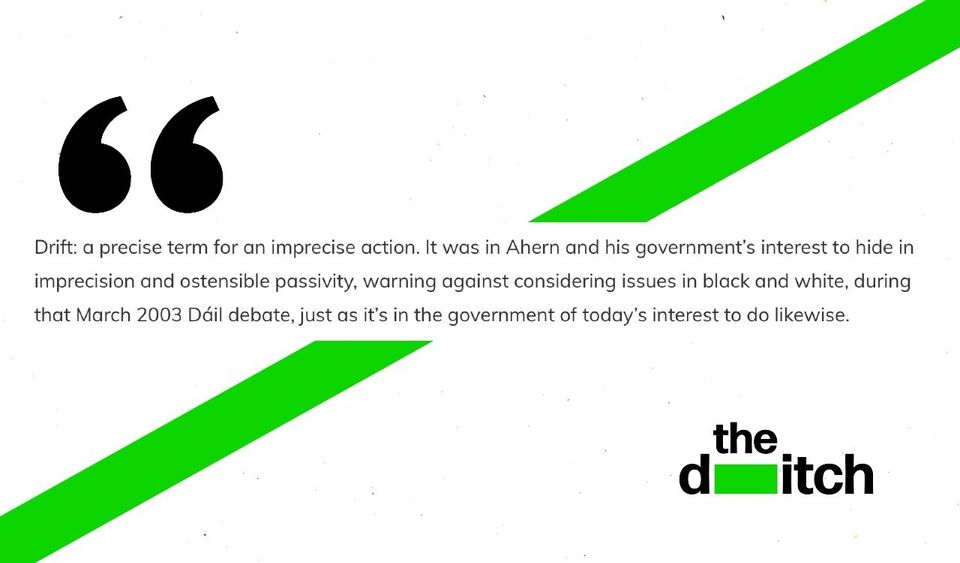Twenty years ago then taoiseach Bertie Ahern told the Dáil that after the 11 September attacks, “The world had entered into a new and dangerous era,” saying the idea, popular among British and American liberals after the end of the Cold War, “that we had reached the end of history proved to be seriously premature.”
There was an absurdity for Ahern to take Francis Fukuyama’s theory about the end of ideology (and therefore history), with liberalism the apotheosis of all its antecedents, and apply it to Ireland, a country that because of its history of colonisation hadn’t yet legally existed for 100 years. There was also an adopted melodrama to Ahern’s speech of this “new and dangerous era”, an Americentric appropriation of a fight that needn’t concern Ireland – it’s not like Mohamed Atta, Marwan al-Shehhi and the others took their hijacked planes and flew them into Liberty Hall and Croke Park.
Ahern made his speech the day the United States illegally invaded Iraq. Ireland’s response, he said, to this new era would be mundane: government had decided to continue to allow the US military to use Shannon Airport.
To explain this decision Ahern didn’t say, with honesty, that his government had decided it was in Ireland’s interests to facilitate the US military’s illegal rendition flights, which would take people the CIA, often wrongfully, considered terror threats to international black sites for the most inhumane torture conceivable. He didn’t say he and cabinet had considered their options and decided they were ethically comfortable with facilitating an illegal war and the crimes against humanity it would bring. He had to be coy. “No simple answers exist. We took a decision after long reflection,” said, telling the Dáil, “The issues are not black and white. International relations involve difficult dilemmas. It is easy to address issues in absolute terms.”
One backbench TD addressed the chamber and spoke in plainer terms. “While we are not at war, we are facilitating it.” In deciding to allow the US’s continued use of Shannon, this TD said, “We simply drifted in the shadow of those who say, ‘Well if it is going to happen and the planes are going to be flying over somewhere else and landing somewhere else, forget that they are landing in Nato bases, we might as well make a bit out of it the same as anybody else.’ I find that shameful.”
The backbench TD was Michael D Higgins. In his intervention he used the same term he used on Sunday to describe Ireland’s foreign policy on matters of neutrality. Two decades ago, “We simply drifted,” into “allowing ourselves to be complicit in an outrageous action” in the US invasion of Iraq. In his interview with the Business Post at the weekend Higgins said, “The most dangerous moment in the articulation and formulation of foreign policy and its practice, since the origin of diplomacy, has been when you’re drifting and not knowing what you’re doing… I would describe our present position as one of drift.”
Drift: a precise term for an imprecise action. It was in Ahern and his government’s interest to hide in imprecision and ostensible passivity, warning against considering issues in black and white, during that March 2003 Dáil debate, just as it is for the government of today to do likewise.
‘Tedious proceduralists, men and women more concerned with rules and convention’
Ahead of this week’s Consultative Forum on International Security Policy, foreign minister Micheál Martin has developed a fondness for the word binary. “The discussion will not simply be a binary one on the issue of neutrality, but will cover a breadth of areas relating to our foreign, security and defence policy,” he has said. “These questions must not be reduced to a simplistic binary choice,” he has said. “We wish to avoid a binary issue. It’s not just about whether you join a military alliance or not. It’s much broader than that,” he has said.
For president Higgins the issue is a clear one – or at least clearer as Martin has made out. “The crawl away from the self-esteem of our foreign policy bothers me,” he said, also warning against aligning with former (and what I would call current) imperial powers. “Any time that Ireland puts itself behind the shadows of previous empires within the European Union, it loses an opportunity of expanding and enhancing and using its influence for the world.” He sees this week’s consultative forum for what it is: “playing parlour games” with Ireland’s traditional neutrality.
Tedious proceduralists, men and women more concerned with rules and convention than matters of actual substance, worried about things like the sanctity of Higgins’s office and what his remarks meant for the state. “The ultimate goal of politics,” for these people, according to philosopher Alain Badiou and what he self-deprecatingly called his “highly speculative reasoning on the concept of democracy”, “is none other than itself. In this case politics would not address the issue of ‘the good state’ but would be its own goal for itself.” Rather than confront and engage with what Higgins said, we instead discussed, in the broadsheet press and drivetime radio slots, what it all meant for the office of the presidency, the analysis sometimes reaching CSPE level.
Before Higgins’s Business Post interview, government representatives spoke with a little more candour about Ireland’s foreign policy and the changes they wished to see.
Former foreign minister Simon Coveney at an event in Harvard University this May said with some confidence, referring to Russia’s illegal invasion of Ukraine, that, “This war is changing the debate in Ireland” and that he thinks “Irish people will be more open to collective approaches to security” without actually making one of these possible collective approaches explicit. He said that the US has “by and large” got its response to the invasion right. “They’re trying to intervene and get that balance,” he said, adding that Ireland “is in the same space.”
Martin, speaking in the Dáil this May, referred to Ireland as “a highly globalised country” and suggested that the country needs to significantly alter both its defence policy and international priorities. “We can no longer rely either on our geographic isolation for our security nor believe that we can isolate ourselves from world events,” he said.
In a writeup of his interview, Business Post journalist Barry Whyte, in a summary yet to be disputed by anyone in government, wrote, "Ireland’s traditional policy of neutrality is currently under review” and that “the possibility of membership of Nato” was to be discussed at the forum.
Government can at least rely on the forum, given its composition, to approach these debates with a certain set of values.
Look what you made me do, brains blew
When the first black footballer to play for Liverpool, Howard Gayle, was offered an MBE in 2016, he turned it down, saying that his “ancestors would be turning in their graves after how empire and colonialism had enslaved them”. He accepted however the appeal of the honour to others. “There will be others who may feel different and would enjoy the attraction of being a Member of the British Empire and those three letters after their name,” he said. Louise Richardson DBE, chair of the security forum, is one of these people.
For a televised debate in 2014 Richardson, who grew up in Tramore, county Waterford, sat beside Martin McGuinness, the IRA’s second-in-command in Derry on Bloody Sunday, who though armed with a machine gun that day “did not engage in any activity that provided any of the soldiers with any justification” for their massacre of 13 civil rights marchers.
“It’s worth remembering that British troops were deployed in Northern Ireland to defend Mr McGuinness’s community and mine from an out of control police force,” Richardson said. McGuiness was able to respond, “They didn’t come in to confront the forces of the state who had treated us like second-class citizens. They came in to defend the state and I think the big difficulty that you have, which I don’t have, is I actually lived there. I went through the experience. That’s a completely different experience from looking at it from a distance.” (Richardson replied, “I don’t doubt that for a second. It still doesn’t justify deliberately targeting civilians).”
That’s a sadly common view for someone like Richardson to espouse, a helpful view for someone who aspires to an honour like a Damehood of the Order of the British Empire, a “very large DBE” as Higgins said. He had to apologise for this “throwaway remark”, as he called it, the force with which this apology was drawn suggesting that pointing out a title like this is more offensive to some than the title itself.
Two of this title’s three letters, BE, signify perhaps the most obvious answer as to why Ireland doesn’t have a functioning defence force of its own, these two letters referring to the empire in whose name Ireland was colonised and remains partitioned to this day, the empire that killed its own people in the north of Ireland as part of its own security policy. It’s because of this empire Nato is already in Ireland, whether we like it or not, in six of the country’s counties. To the chair of government’s neutrality forum, this empire’s occupying forces were here for our own good.
This is the kind of nuance the people convening this forum want us to engage in, which should be rejected. Sometimes things can be simpler than they seem.
Jean Tarrou, conscience of Albert Camus’s The Plague and stand-in for Camus himself, towards the work’s denouement, gives a soliloquy in which he explained why he rejected the values of his respectable father, a prosecutor whom he had seen in court call for the execution of accused men. “I told myself that meanwhile, so far anyhow as I was concerned, nothing in the world would induce me to accept any argument that justified such butcheries.”
Tarrou tried to use plain language, the kind government doesn’t want to employ when talking about Ireland’s neutrality and what the changes they seek will mean.
“You see, I'd heard such quantities of arguments, which very nearly turned my head, and turned other people's heads enough to make them approve of murder; and I'd come to realise that all our troubles spring from our failure to use plain, clean-cut language. So I resolved always to speak, and to act, quite clearly, as this was the only way of setting myself on the right track.”
Twenty years ago Bertie Ahern told us the world isn’t black and white. We learnt that the shade of grey Ahern’s and later governments had Ireland occupy was to play a “vital” role in accommodating illegal rendition flights and facilitating torture.
Today we’re told our neutrality isn’t binary. It should be.


